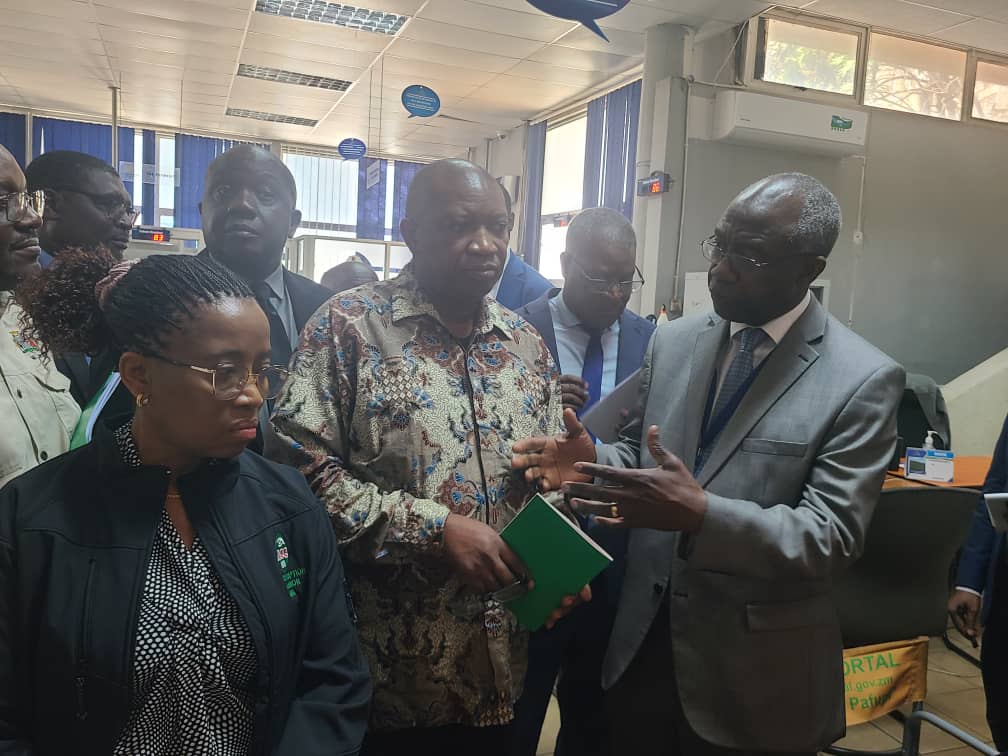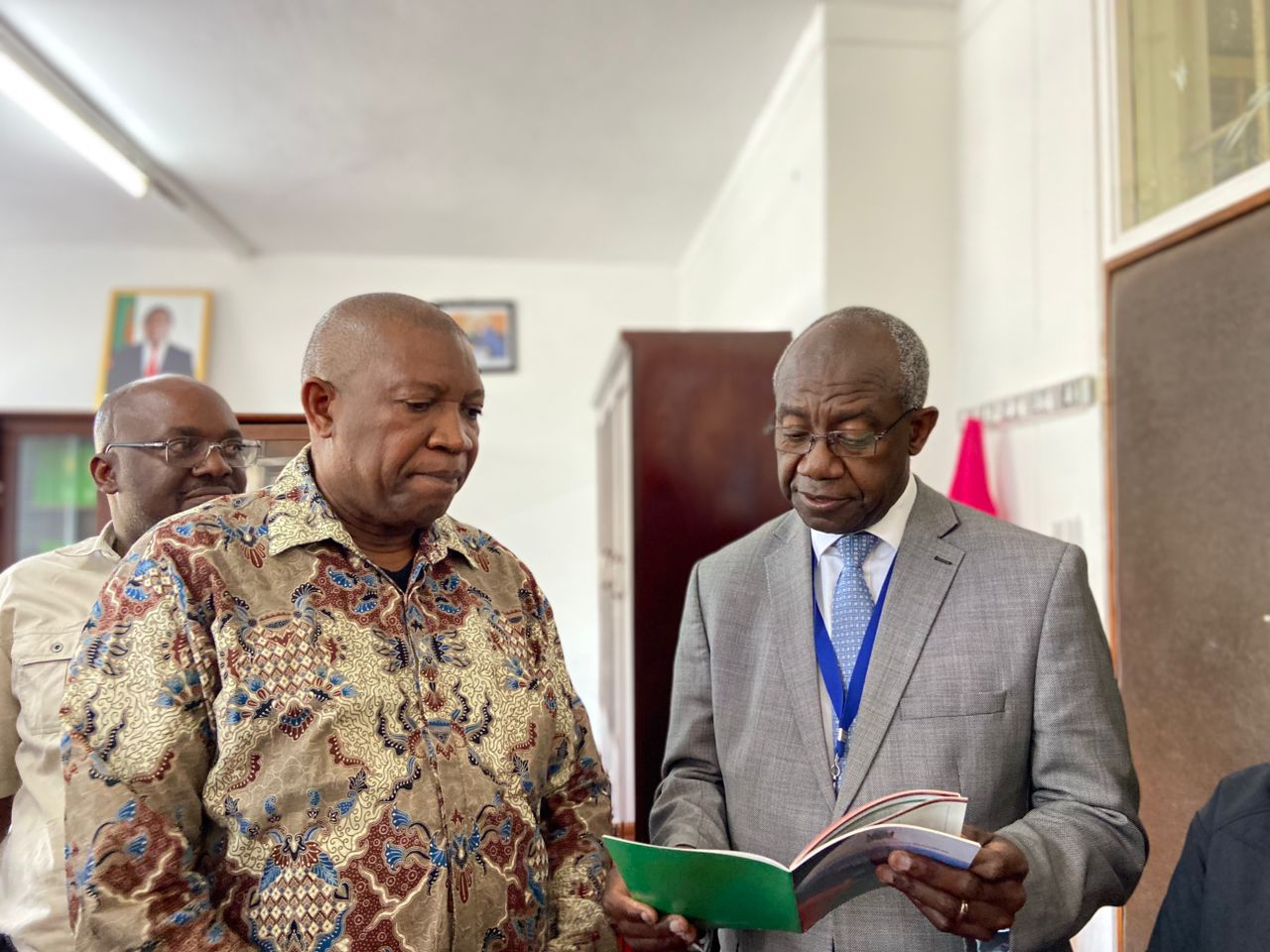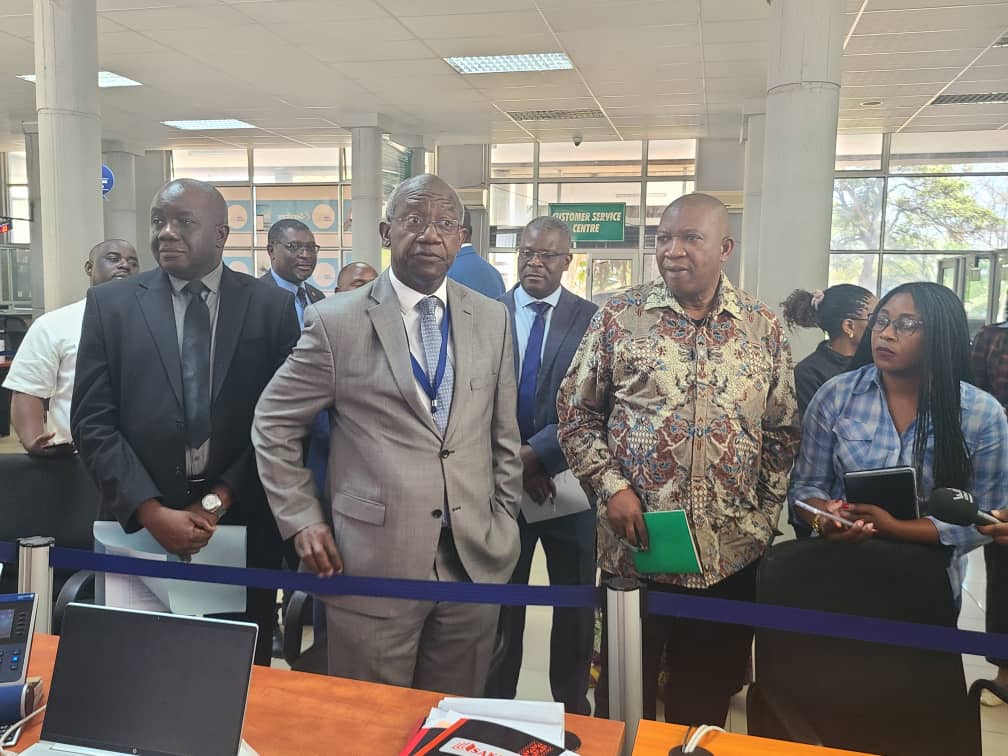Service Charter Put to the Test
 Secretary to the Cabinet makes an unannounced visit, exposing gaps in communication and workflow while putting daily operations to the ultimate test.
Secretary to the Cabinet makes an unannounced visit, exposing gaps in communication and workflow while putting daily operations to the ultimate test.By Francis Maingaila ♥️
The Secretary to the Cabinet, Patrick Kangwa, today made a surprise visit to the Ministry of Lands to assess the implementation of its service charter, a key public service tool designed to enhance transparency, efficiency, and accountability by outlining the standards of service citizens should expect and reinforcing government institutions’ commitment to delivering timely and quality services.

Speaking during a high-level coordination meeting, Kangwa acknowledged the efforts of ministries in preparing comprehensive service delivery documents but expressed concern that many of these remain unused.
“We have done a very good job in consultations and producing documents, but these often end up on the shelf. We have come here to get them out, put them on display, and ensure that the systems function so that citizens can hold officers accountable,” he said.
He emphasized the need for ministries to communicate changes promptly and transparently.
“When there is a change in any document, it must be sent immediately. Do not wait and assume the process will take care of itself,” Kangwa said.
Accurate reporting, he added, is essential for accountability. Numbers and data must reflect reality so that officials can answer for their performance and decisions.

Kangwa also stressed the importance of reaching the “last mile” – ensuring that citizens in remote areas, such as Kaputa, can access services and have their complaints addressed.
“The last smile is about my mother in Shankombo, my aunt in Kaputa being able to access services, lodge complaints, and have the information reach the relevant authorities,” he said.
Using practical examples, Kangwa explained how ministries should guide citizens. For instance, if a client wants to register a house online, officials should provide step-by-step instructions.
Similarly, complaints about corruption should be handled safely and escalated appropriately to avoid putting whistleblowers at risk.
Awareness campaigns are key, he said, to inform citizens that their feedback will reach the right people.
Highlighting efficiency, Kangwa warned against allowing individual laziness or bottlenecks to compromise service delivery.
“One person sitting somewhere incorrectly or being lazy should not slow down the system. Reports must reach us without delay. This is essential for accountability,” he said.
The Secretary also pointed to digital systems as a crucial tool for improving service delivery and minimizing corruption.
“Most services can now be accessed from the comfort of home or office. Security features have been enhanced, but legacy challenges remain as we transition data from old systems into the new digital platform,” Kangwa explained.
He urged public patience as the government works to integrate older records and streamline services.
Kangwa instructed that all officers ensure the service charter is operational, accessible to the public, and reinforced through toll-free numbers for reporting concerns.
Ministries were reminded that the charter is not a document to remain on the shelf—it must guide real-world service delivery.
The Cabinet Secretary concluded by urging public servants to uphold integrity and collaborate effectively.
“We are all part of the ecosystem here. Let us work together to serve our people efficiently, uphold integrity, and respond to the needs of citizens. This is our duty, and it is a privilege to do so,” he said.
Kangwa’s remarks come as part of the government’s ongoing efforts to improve public service delivery through digitization, transparency, and citizen-focused accountability.
The public service charter is intended as a social contract between the government and Zambians, reinforcing the message of service, integrity, and responsiveness.
Customer Service Center Boosts Accessibility
Speaking when Kangwa paid his surprise visit to the Ministry of Lands, Patrick Mucheleka, the Permanent Secretary at the Ministry, said the Ministry’s newly established customer service center is a key step toward improving access to land and property services.
He noted that the center features two toll-free lines and officers available from 8:00 a.m. to 5:00 p.m., ensuring citizens can receive assistance even outside standard office hours.
“The center allows us to respond promptly to the public and remain in touch with the Anti-Corruption Commission to strengthen functions at the local level,” Mucheleka said.
“We are conducting workshops to review our processes and explore ways to further enhance service delivery.”
Mucheleka explained that digital platforms are being used to reduce direct human interaction, allowing citizens to access services, make payments, and complete transactions online.
The Ministry is encouraging citizens to take advantage of these systems to avoid long queues and delays.
“Even in rural areas, people can access our services through local offices or post offices,” he added.
“Our goal is to ensure services are widely accessible, convenient, and transparent.”
The Permanent Secretary also emphasized the importance of citizens fulfilling their responsibilities, such as paying fees for land and property services.
He acknowledged challenges with local authorities overcharging for certain services and said the Ministry is working with the government to ensure fees remain fair and affordable, as directed by the President.
Mucheleka concluded by stressing that while significant progress has been made in raising awareness and improving service delivery, more work is needed to ensure all citizens can easily access the Ministry’s services both online and in person.
ACC Raises Alarm Over Land Delays
Meanwhile, Director General of the Anti-Corruption Commission (ACC), Dalphine Chabu, expressed concerns over delays in issuing land titles and offer letters, warning that such delays could result in land and resources being concentrated in the hands of a few.
“Delaying the issuance of title deeds and offer letters means that money intended for the benefit of the entire Zambian population ends up in the hands of a single person" he explained.
"We advocate for the equal distribution of land, as every Zambian is entitled to land. Making it difficult for the common citizen to access land results in land concentrating in the hands of just a few,” he added
Chabu’s comments come amid ongoing debates over land allocation policies and the need to ensure equitable access for all Zambians.
The ACC chief stressed that proper distribution of land is not only a matter of fairness but also critical in preventing corruption and mismanagement of national resources.
ZRA Lands Officer Sandra Munamoonga expressed commitment to improving service delivery and upholding integrity within the Commission.
She praised Cabinet officials for their visit and encouraged collaboration among staff to ensure the Commission’s objectives are met.
“We remain committed to delivering quality service and ensuring fairness in all our operations. By working together and upholding integrity, we ensure that the Commission continues to serve Zambians effectively,” Munamoonga said.
The engagement underscores ongoing efforts by the ACC and government agencies to promote transparency, equitable land distribution, and efficient public service delivery.
Citizen Feedback Highlights Communication Gaps
Meanwhile, Wisdom Gondwe, a client at the Ministry of Lands, called on civil servants to strengthen communication across all levels of government and ensure timely implementation of policies and programs.
Speaking during a recent engagement, Gondwe praised officials for their efforts in interacting with citizens but noted that gaps in information sharing continue to hinder efficient service delivery.
“It’s a good thing that you are here, and we want to appreciate your efforts in maintaining interaction. As leaders, you must operate effectively at all levels—lowest, middle, and highest—to ensure that the public service functions smoothly,” Gondwe said.
He highlighted the country’s transition from manual to electronic government as a positive step, allowing tasks to be completed anytime and anywhere.
However, he noted that information is sometimes withheld from relevant managers, creating delays and inefficiencies.
Gondwe cited a recent example at a municipal office where a newly appointed minister was not properly briefed, calling the situation “unacceptable in government operations.”
He also pointed to a long-standing problem affecting children for 67 years that had been resolved but remained stalled due to delays in follow-up actions.
“People often blame the President or the government, yet it is not the government that is at fault. The President cannot be in every office, and we—civil servants—are responsible for taking action,” he emphasized.
Gondwe urged civil servants to take ownership of their roles, ensuring that policies and programs are implemented efficiently for the benefit of the nation.



Comments
Post a Comment